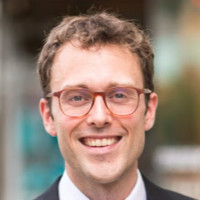Date/Time
Date(s) - October 27, 2021
4:00 pm - 5:00 pm
Location
Lory Student Center
Categories No Categories
Ryan Hearty to speak on environmental engineering in late-twentieth-century United States

Ryan Hearty is completing a PhD in history of science and technology at Johns Hopkins University, where his work focuses on interdisciplinary collaboration in engineering. Hearty’s dissertation is about water quality management in the United States since 1945 and how experts defined, monitored, and modeled water pollution on behalf of state, regional, and federal agencies. Before pursuing graduate training in history, Ryan has worked as an engineer on the radio communications for NASA’s Parker Solar Probe and has a master’s degree in electrical engineering. In his upcoming lecture at CSU, Hearty will consider the development of “the moral field” in environmental engineering in the late twentieth century U.S. and how environmental engineers have considered their place in a field with significant implications for human adaptation in a changing world.
Who are environmental engineers?
According to the National Academies of Sciences, Engineering, and Medicine, environmental engineers are uniquely equipped to address several of society’s “grand challenges:” supplying populations with food, water, and energy; mitigating climate change; reducing pollution and waste; creating smart cities; and encouraging informed decisions about our shared environments. Yet most of us have a vague understanding of what environmental engineers do and why they do it. Who are these engineers, and what is their relationship to the “environment” or environmentalism?
Engineering a moral relationship to the environment
Part of the answer has to do with engineers’ moral encounters with the new category of the environment, which emerged in the United States after the Second World War. Some environmental engineers infused moral arguments about the promises and pitfalls of technology, pollution, marginalized communities, non-human nature, and societal risk into their teaching, writing and research, and their career decisions. In this talk, Hearty will explore how environmental engineers of the 1960s, 1970s and 1980s dealt with environmental concerns in ways that differed both from other engineering disciplines and from an older generation of sanitary engineers.
The moral field
Using brief case studies, Hearty reconstructs these engineers’ “moral field.” This term, promoted by historian and AHA president Jan Goldstein in 2015, refers to “the set of normatively charged considerations—derived from diverse sources and ambient rather than codified—that seem to have guided” a particular group of historical actors. I explore how engineers promoted some moral claims over others as more compatible with an engineering worldview. By charting out the moral field of environmental engineers, this talk will contribute to our understanding of larger debates in the 1970s and 1980s over environmental reform and the role of engineered technologies in sustaining capital-intensive, industrial ways of life.
The PLHC and our co-hosts, the School of Global Environmental Sustainability (SoGES) and the Department of Philosophy at Colorado State University, are pleased to present this thought-provoking and cross disciplinary event. We hope you will join us for this lecture from on October 27, 2021, from 4:00-5:00 at the Lory Student Center.